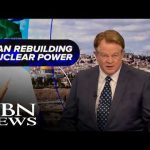Steve Forbes has sounded the alarm about an accelerating nuclear threat from Kim Jong Un’s North Korea and argued bluntly that the only credible way to blunt that threat is a dramatic return to forward-deployed deterrence — including placing U.S. nuclear weapons on South Korean soil. His warning, delivered on his “What’s Ahead” program, is not the ravings of an alarmist but the sober voice of a man who understands that deterrence rests on credibility, not hopeful diplomacy. Americans who love peace ought to be as eager as he is to preserve it by strength rather than wishful thinking.
Pyongyang is not twiddling its thumbs while pundits debate posture; it has been methodically advancing its missile and warhead capabilities, recently completing ground tests of a powerful solid-fuel rocket engine and signaling imminent long-range launches. Those developments materially increase North Korea’s ability to field mobile, survivable delivery systems that can strike our allies and threaten the homeland, which means the old assumptions about containment no longer hold. The regime’s weapons program is moving from theoretical menace to operational reality, and Americans should stop pretending otherwise.
U.S. intelligence has warned that Kim Jong Un has no intention of negotiating away his nuclear arsenal and may be prepared to conduct further nuclear and ICBM tests on short notice — a point that makes passive strategies dangerously naive. If the intelligence community says a test could come soon, policymakers must plan not with platitudes but with hard choices that restore deterrence and reassure allies. This is not scaremongering; it is the sober assessment Washington’s leaders are obliged to heed.
Some will say returning nuclear weapons to the Korean Peninsula is provocative, but the truth is more uncomfortable: weakness is provocative. South Korea’s leaders have repeatedly stressed reliance on U.S. extended deterrence rather than developing their own arsenal, making American credibility indispensable in the region. Our alliance will collapse into doubt if Washington cannot back its commitments with tangible capability and posture, and that erosion of trust is exactly what emboldens dictators like Kim.
This moment calls for decisive action, not endless committees and cross-party handwringing. Redeploying a limited, secure nuclear presence to South Korea — combined with accelerated missile defense and conventional modernization — would restore the clear red line Pyongyang now doubts exists. Conservatives who love country should demand that Congress and the White House stop punting on deterrence and start treating national security like the existential priority it is.
Hardworking Americans and our allies deserve leadership that understands peace through strength. If our leaders balk at the unpopular but necessary steps, they will be judged harshly when the crisis that could have been prevented arrives. It is time to choose strength, stand with South Korea, and make deterrence unmistakable to any regime that contemplates attacking the free world.




